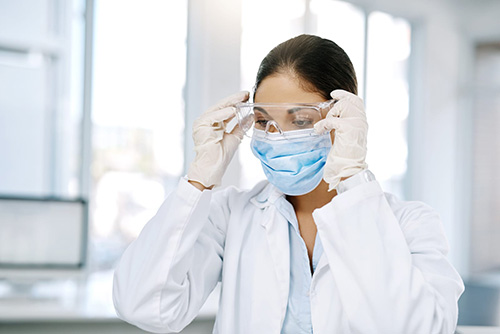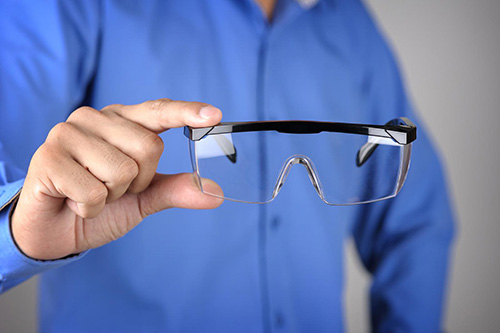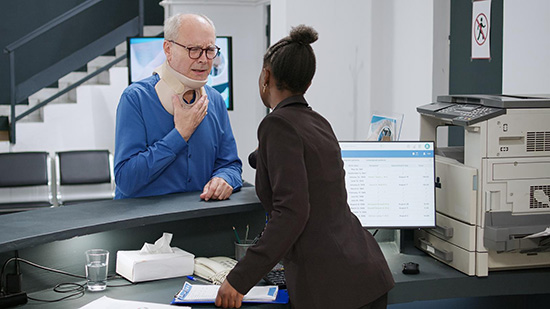Don’t miss out on the compensation you deserve if you suffer an eye injury or disease at work
From manufacturing hubs to construction sites, South Carolina workers across various industries clock in every day, often unaware of the looming threats to one of their most vital senses: their vision.
While the Palmetto State is renowned for its rich history and southern charm, it’s also a place where many face occupational hazards that can jeopardize their eye health and even prevent them from continuing to work.
This article will discuss common eye issues in the workplace and explain how to file a claim for workers’ compensation benefits if you’ve been affected.
South Carolina vision and work injury statistics
According to data from the Vision Center, almost 6% of South Carolina residents report having some form of vision loss that isn’t correctable by glasses, including blindness. The rate is even greater among South Carolinians with diabetes (12.3%) and those who smoke (8.46%).
In addition to these factors, many workplaces also pose a risk of eye injuries. In fact, according to the U.S. Bureau of Labor Statistics (BLS), U.S. workers in 2020 experienced more than 18,510 eye-related injuries that required at least 1 day off work.
The primary causes included:
- Contact with objects and equipment (11,980)
- Exposure to harmful substances or environments (4,830)
- Violence from another person or animal (1,200)
- Slips, trips and falls (290)
Construction workers were most likely to suffer an eye injury, particularly electricians. Other dangerous trades included material movers, building cleaners, pest control workers, metal and plastic workers, and general repair workers.
What are common causes of eye injuries at work?
Work-related eye injuries can result from a variety of incidents and exposures. Some of the most common include:
- Flying objects. Small particles, such as metal slivers, wood chips or dust, can be ejected by tools or equipment, leading to eye injuries.
- Malfunctioning equipment. Malfunctioning or mishandled tools, machines and equipment can cause splinters, shards or larger objects to strike the eye.
- Chemical exposure. Accidental splashes of harmful chemicals, solvents or corrosive substances can cause chemical burns and other eye damage. This is particularly prevalent in laboratories and industries dealing with chemicals.
- Welding light exposure. Welders and those nearby can experience “welder’s flash” or “flash burns” from the ultraviolet light produced, which causes painful inflammation of the cornea.
- Laser exposure. In industries or laboratories where lasers are used, direct or reflected laser light can burn the retina, leading to permanent vision damage.
- Radiation exposure. Extended exposure to ultraviolet or infrared radiation, especially without protection, can result in harm to the eyes.
- Dust and pollutants. In environments with excessive dust or airborne pollutants, particles can get into the eyes, causing irritation, scratches and severe injuries.
- Improper use or lack of personal protective equipment (PPE). Not wearing safety glasses, goggles, face shields or welding helmets as required or using them improperly can expose workers to eye risks.
- Computer vision syndrome. While not an acute injury, prolonged computer usage can cause eye strain, discomfort and long-term issues.
- Accidental impacts. Walking or running into obstacles, especially in inadequately lit areas, can also result in eye injuries.
What is a work-related eye disease?
An eye injury at work can also lead to a serious condition like an eye disease. These can be transmitted through fluids or other contaminated sources that make contact with the mucous membrane of the eye.
If you’re splashed with blood, for example, or if you’re wounded in an environment with hazardous particulates in the air, these could be potential sources of diseases like the hepatitis B virus or avian influenza. Another risk factor is if you rub or touch your eyes with contaminated hands.
Eye diseases are distinguished from eye injuries in the sense that you can have one without the other. An injury might heal but leave you with a disease, or a disease might develop without you having been injured at all.
South Carolina Workers’ Comp Eligibility and Requirements
A complete guide to workers’ comp for employers and employees in South Carolina.
What are the most common symptoms of an eye injury?
The most obvious symptoms of an eye injury are redness, pain and discomfort. Depending on the type of injury, other symptoms may include the following:
- Excessive tearing
- Blurry or decreased vision
- Light sensitivity
- Swelling around the eye
- Double vision
- Unequal pupil sizes
- Visible foreign objects or debris in the eye
- A persistent feeling that something is in the eye even if it can’t be seen
- Cuts or puncture wounds on or around the eye
- Bruising around the eye
- Eye discharge
- A protruding or sunken eyeball
- Cloudiness or opacities on the eye’s surface
How do I know if my eye injury is serious?
Many eye injuries are minor. They may get scratched, irritated or inflamed after an accident, but they quickly heal on their own.
Then there are eye injuries that don’t go away. Maybe they’ve gotten infected; maybe they’ve suffered damage that goes beyond the cornea and into the supporting muscles and ligaments underneath.
Either way, if you’re experiencing a serious eye injury, here are a few symptoms that can serve as a red flag that you need medical treatment:
- Vision changes (like blurred or double vision) or vision loss
- Extreme sensitivity to light
- Limited “range of motion” in the eye
- Pain or numbness in the eye or eye socket
- A change in pupil size or shape
- Abnormal, uncontrollable eyelid movement
- Inability to open the eye
- Blood in any part of the eye
Things you should NEVER do when someone has an eye injury
If you’re in a work environment where eye injuries are common, it’s important to understand the right and wrong ways to respond to an eye emergency. Here are a few things that you shouldn’t do:
- Don’t remove your contact lenses.
- Don’t rub your eyes.
- Don’t put direct pressure on your eyeball.
- Don’t remove any objects from the eye, especially penetrative ones.
Additionally, if a chemical is splashed into your eye, don’t rinse it with anything other than sterile saline or water.
What types of eye protection are recommended at work?
Eye protection is one of the best ways to avoid a workplace eye injury. The National Safety Council (NSC) and the Centers for Disease Control and Prevention (CDC) generally recommend the following:
Safety glasses to protect the eyes from dust, dirt, or flying particles

Prescription safety glasses to protect workers who wear regular glasses when not working

Goggles to protect the eyes from smaller flying particles and chemicals

Face shields to protect the eyes and entire face from potentially dangerous debris and chemicals

Specialty protection like ventilated helmets, face guards or goggles to protect those working with hazardous radiation, lasers, ultraviolet light, etc.

Qualifying for workers’ comp benefits in South Carolina
Most employers are required to carry workers’ comp insurance in South Carolina. This is a law overseen by the South Carolina Workers’ Compensation Commission (SCWCC).
That said, there are exceptions for businesses that employ fewer than 4 workers. Additionally, seasonal workers and independent contractors aren’t typically covered under workers’ comp.
If you want to verify that your employer has the required workers’ comp coverage, you can use this online tool to verify their insurance status in South Carolina. A work injury attorney can also help you determine your eligibility for benefits after an injury.
Another important point: While you don’t have to prove that your employer was at fault for your eye injury to get compensation, you must be able to prove that your injury was work-related, meaning that it was directly caused by your job. This includes both one-time accidents and long-term health conditions that arise from your employment.
What workers’ comp benefits am I entitled to after an eye injury?
There are several types of benefits available to injured workers, including:
- Medical benefits for all necessary medical treatment, including doctor’s appointments, prescriptions, therapies, surgeries and supplies
- Wage loss benefits that cover two-thirds of your lost wages if your injury requires you to miss work
- Death benefits for certain dependents if an injury leads to the eventual death of a worker
My Workers’ Comp Claim Is Denied, Now What?
Learn what to do if your workers’ comp claim is denied in South Carolina.
Steps to filing a workers’ comp claim in South Carolina
If you suffer an eye injury, you’ll need to follow the proper procedure for filing a workers’ compensation claim in South Carolina. Failure to do so can result in the denial of your claim.
Here are the steps to take:
- Seek medical treatment for your injury. This is an important first step in establishing that your injury was caused by your job.
- Notify your employer of your injury. In most cases, this must be done within 90 days of your injury or the discovery of your injury or disease.
- Wait for your employer to file a claim with the SCWCC. If they refuse to do so, you can file it yourself by submitting Form 50 to the Commission.
- Contact an attorney. If your employer is pushing back against your claim or if you want advice as to how much your claim is worth, consider talking to an experienced work injury attorney who can explain your rights.
In the news:
The Zaxby’s hot grease case
In 2023, a man made headlines in South Carolina after dousing a co-worker with hot grease. It happened at Zaxby’s restaurant on Blue Ridge Boulevard, about 45 miles west of Greenville, after the two workers had been fighting. The victim was taken to the hospital with burns on his eyes, face, shoulders, back and hands.
While tragic, it’s a case that serves as an example of how eye injuries at work can happen under many different circumstances, including the completely unexpected.
Get help with your eye injury claim from the experienced work injury attorneys at Chappell, Chappell & Newman
Depending on their severity, eye injuries can have a major impact on your ability to work and even perform simple tasks at home without assistance. If you suffer an eye injury or disease at work, don’t wait to get the help and compensation you need.
The experienced workers’ compensation attorneys at Chappell, Chappell & Newman have been fighting for the rights of injured workers in Columbia and the surrounding areas for more than 30 years, and we’d love to help you too. We can handle all the paperwork and the negotiations with your employer and their insurance company for you, so you can focus on your recovery.
Contact our office today for your free consultation.


